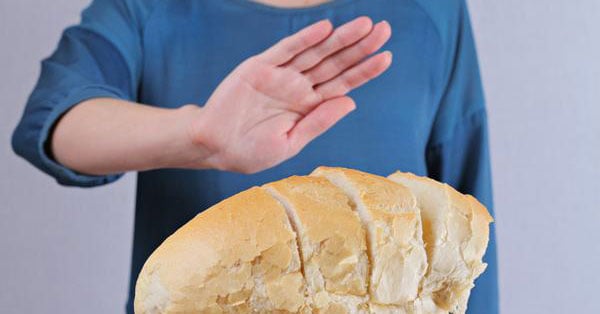Many people have gluten intolerance and don’t know it.
In fact, for many of you, gluten is the source your symptoms.
The trouble is that gluten allergies don’t present like a typical allergy.
- You won’t get hives or break out in a rash.
- You don’t throw up when you eat it.
- Your stomach doesn’t hurt after a high gluten meal.
Gluten allergies present much differently than other allergies.
So how the heck would you know if your body was not responding well to gluten?
Here are the top 4 signs I know that someone’s gut is not responding well to gluten:
1. Symptoms
The classic gluten intolerant signs are brain fog, chronic low energy, joint pain, bloated belly, incurable hunger, trouble losing weight and depression for no particular reason.
And other conditions have a gluten intolerance at their root. These conditions include autoimmunity, hormone imbalances, mood disorders, and thyroid problems. If these symptoms and conditions are not improving, it’s time to try the two-week gluten-free test.
What’s the two weeks GF Test?
The two week GF Test is where you take ALL sources of gluten out of our diet. This includes the most obvious ones like bread and pasta. To do this, you really have to read labels. For example, did you know that cornstarch has gluten in it? Cornstarch is in many sauces. In order for this test to work, you have to pull every ounce of gluten out for two full weeks.
What are you looking for during this test?
Any change in your symptoms. Sometimes this looks like a cloud that has been lifted from your brain and you start thinking clearly again. Or you wake up before your alarm for the first time in a long time. Or maybe that chronic knee pain you’ve had finally goes away.
For some of you, you won’t notice any change. But when you add gluten back to your diet, you feel worse than ever. These are the people that have the most severe gluten allergies. Your gut may be so inflamed from the damage gluten does that in two weeks, the inflammation is just starting to come down.
2. White Tongue
Wheat (which contains the highest amounts of gluten) has mold, pesticides, and glyphosate in it. Ingestion of these substances creates the perfect environment for yeast to grow.
Too much yeast in your gut creates a condition called Candida.
One of the classic ways you know you have Candida is by looking at your tongue first thing in the morning. A white coated tongue is a sign you have Candida. A diet high in bread, sugars, and alcohol are the main contributors to candida.
If you want to know more about Candida, check out my YouTube channel. I have done several short videos on what you need to do if you have this gut imbalance. Here’s a link to my channel. There are lots to learn there!
3. Bowel Habits
So let me be frank for a moment.
You need to have a bowel movement every day. Twice a day is actually best. If that’s not happening, you can pretty much assume your microbiome is not healthy.
The lining of your gut has delicate little cilia on it. These finger-like projections help keep food moving through your gut. Gluten destroys these delicate cilia and slows down the movement of food through your gut.
When your gut can’t move food through quick enough, toxins have more access to your bloodstream. This allows for autointoxication to happen and gives harmful chemicals access to your brain. Without proper bowel movements, food can also get stuck on the side walls of your gut and ferment, allowing Candida to grow.
Not having a daily bowel movement can be a major health problem. The first step to repairing this problem is to take out the foods that are harming it. Gluten would be top on my list.
4. Chronicity of problem
Lastly, if you have a condition that is not improving, it’s time to remove gluten. When I have a patient who is not responding well to chiropractic care or not responding as quickly as I want, I think gluten intolerance.
I cannot tell you the number of times I’ve had patients with chronic pain improve with the two week GF test. When the gut is damaged by gluten, it creates inflammation. That inflammation circulates throughout your whole body. You will notice the inflammation most in the areas of your body that are already weakened or injured.
I know it’s no fun to skip the bread. But ask yourself, which is harder: not eating bread or living in a body that doesn’t feel good.
I highly recommend you try the two-week gluten test and see what happens. You may surprise yourself.
Hope that helps!
Have an awesome day!!
Dr. Mindy









Leave A Comment